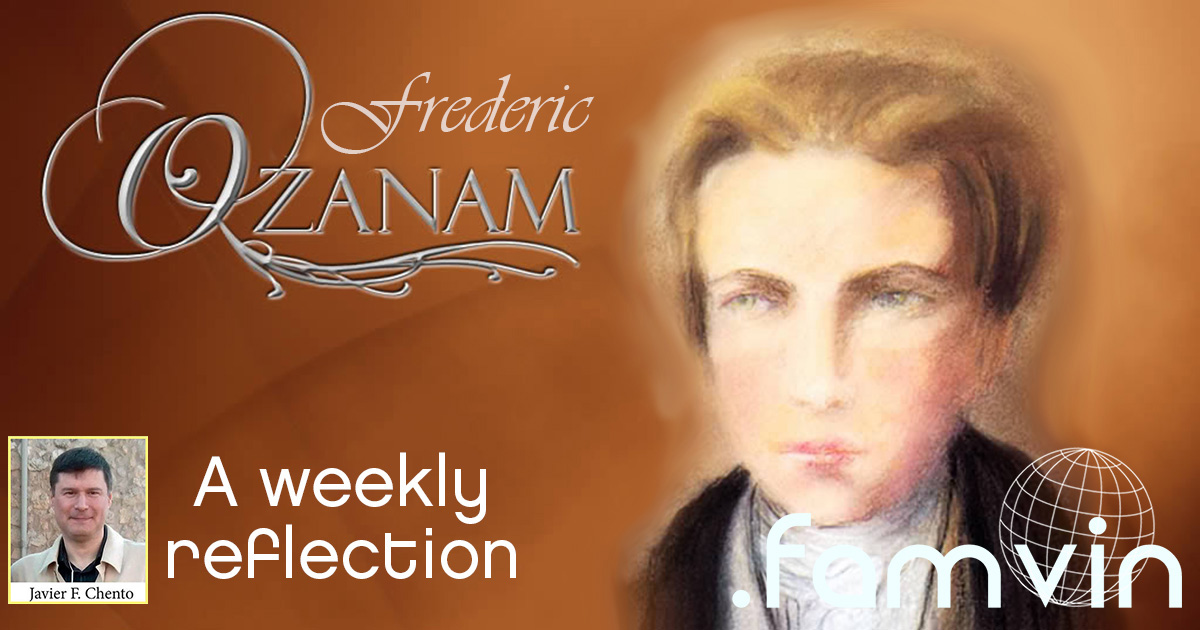All Catholic countries have placed charity in the law, but what has saved them is that they have not extinguished it in their hearts. The ordinances of the kings of France would never have relieved the provinces of the misery that followed the wars of Louis XIII if Vincent de Paul had not been free to shake off his idleness, to importune and to remove from their passivity those opulent families, from whom he got the alms to alleviate the disasters of Champagne and Lorraine. […] On the contrary, when selfishness, under whatever name it manifests, seeks to exempt individuals from the duty of assistance to put it in the hands of the State, legal charity is nothing more than a legal fiction, which first deceives the peoples and later ruins them.

Frederic Ozanam, “De la charité légale” [On Legal Charity], in L’Ère Nouvelle, November 5, 1848.
Reflection:
- Vincent de Paul lived in a turbulent age, filled by wars that plunged a large part of the population into poverty, hunger and disease. “Vincent, who had consecrated his life to the poor, had to concern himself with those whom the wars left in great misfortune. He collaborated with others and even organized collections himself that he would send off to towns that were most harmed by the war. We have written accounts of his companions being sent to these places. Their work also included evangelization and celebration of the sacraments, burying the dead, caring for the survivors, and providing what was necessary to get people back to work, thanks to the seeds and impalements sent by Vincent. In Paris, Vincent gave shelter to refugees, to noblemen, to religious women, and to girls in danger.” (Cf. Álvaro Quevedo Patarroyo, CM, St. Vincent, priest of charity in the service of the poor, in Vincentiana, Vol. 44, 2000).
- Frederic brings the example of Vincent de Paul to explain that charity, properly understood, can not depend solely on the State. All of us who form society have our responsibility to make all people live their life with dignity. To delegate this function to the government is to be against the duty of every good Christian to help the brother or sister in need, as Jesus himself teaches us in the parable of the Good Samaritan (Cf. Luke 10:25-37). Could we imagine that the good Samaritan, seeing the wounded man on the side of the road, would have simply approached the local authorities to notify them, and continue calmly on his way? It does not seem that this can be an attitude consistent with the Gospel.
- In the early days of the Church, the first Christians organized themselves to help widows (see Acts 6 and 1 Tim 5). Charity is something permanent and intrinsic in the constitution of the Church and in the being of every believer: so much that it is the heart of the Gospel.
- In our time, we sometimes listen the suggestion to delegate, with a certain ease, all the responsibilities of helping the impoverished to the rulers of the moment. However, as Frederic says, it is no more than fiction and selfishness, an easy way to get rid of the responsibilities that all, believers or non-believers, have to build a more just world for all, even at the expense of our own well-being. How many of us are willing to carry out this?
Questions for dialogue:
- Do I work actively and personally in the relief and help of the poor?
- Do I use my personal income for their promotion?
- Am I willing to commit myself to transform the reality that surrounds me, following the example of Saint Vincent de Paul?
Javier F. Chento
![]() @javierchento
@javierchento
![]() JavierChento
JavierChento








Caro Javier. Não à duvidas.
1.) Nos tempos de Napoleão foi uma desgraça que o povo sofreu e realmente foi pena. O homem só complica. Sinceramente hoje nos tempos de “riqueza” seria bom que existisse um novo SVP mas, não existe e o mundo os povos só podem contar com todos nós vicentinos. Em Portugal tenho sentido falta de Lares para idosos principalmente. Não há e quem podia dar um jeito, não dá. Aqui a igreja tinha um papel importante na transformação de prédios para lares.Perguntam-me quando questiono o porquê de a Diocese do Porto-Portugal não querer ou (poder…) assumir a falha, perguntam-me logo: Quem paga?.
2.) quanto à questão colocar a assistência no estado realmente tem razão. O estado não tem vocação para acudir os desfavorecidos pela sorte, pela sentidos de Caridade pela razão de sermos filhos do mesmo Deus. O estado pensa em números, estatísticas, não ama. Mas repare, mesmo aqui existe também padres que não conhecem o carisma vicentino e eles mesmo dizem; assistência social é com o estado, com o IPSS. Por isso o papel dos vicentinos é importante em qualquer sociedade civil. Todos estes serviços são importantes, em colaboração mas, o estado não tem, não interessa-lhes ter o carisma de SVP. Se não são muitas vezes os vicentinos uma sociedade civil sentia-se desprotegida da sorte e nos vamos a casa, acompanhamos, ajudamos em muitos aspectos e tentamos que eles se livrem do vale, da saca da dependência da esmola. Enfim, que o Espírito Santo elimine os nossos corações. Estes pontos são importantes para a formação vicentina mas, há tantos vicentinos desinteressados em receber formação.
Da minha parte, acompanho-vos amiúdo e, vou parar e publicar no nosso blogue este texto e, depois distribui-lo.
PAZ E BEM